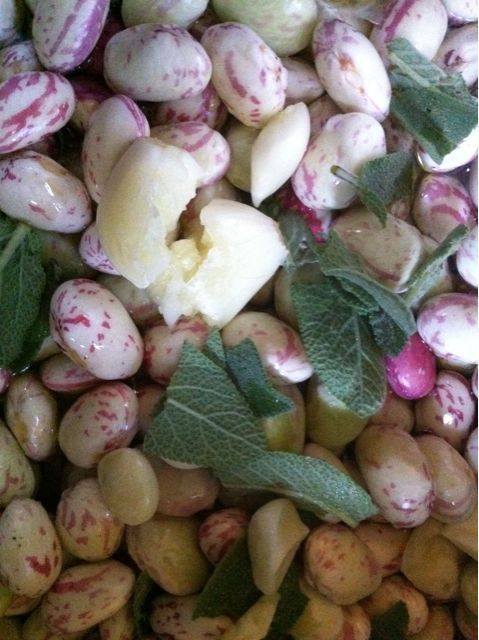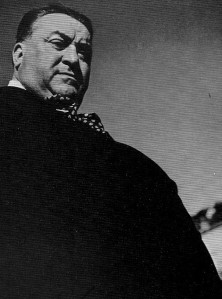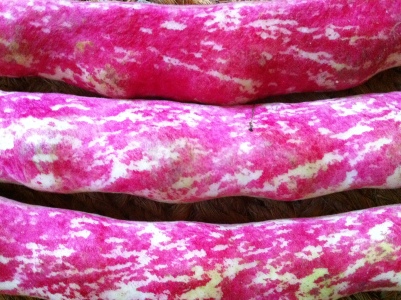You are currently browsing the tag archive for the ‘Food’ tag.
You have to admit that fresh borlotti beans are very pretty. They are also quite hard to find. Maybe that will change. It seems rather quaint now to read Elizabeth David’s advice in her book on Italian Food on how to obtain that rare and exotic vegetable, the courgette.
I hope borlotti beans don’t go quite the same way: for now, fresh ones are still unusual enough in England that it’s a special occasion when I can buy some from the farmers’ market, or find a few in a veggie box from Valvona & Crolla. Finding courgettes doesn’t have the same effect. I was quite pleased the first time I bought some courgette flowers locally, but making a meal with them reminded me of the orchid scene in Barbarella.
 Beans are rather more substantial, and last week I was lucky enough to spot some at the farmers’ market. I suppose that if they start to appear more regularly, I’ll have to find a few different ways to cook them, but while I can only get them once or twice a year, I’ll stick with Marcella Hazan’s recipe for Assunta’s beans (from her book, Marcella Cucina).
Beans are rather more substantial, and last week I was lucky enough to spot some at the farmers’ market. I suppose that if they start to appear more regularly, I’ll have to find a few different ways to cook them, but while I can only get them once or twice a year, I’ll stick with Marcella Hazan’s recipe for Assunta’s beans (from her book, Marcella Cucina).
It’s a very simple recipe: shell the beans, put them in a pan with a few cloves of garlic, a handful of sage leaves, salt, pepper, a good glug of olive oil and a bit of water. Cover the pan and simmer for one and a half to two hours.
You can eat the beans just as they are, or put them on toast. You could add tuna (Marcella approves!) to make a sort of warm version of tonno e fagioli, but I prefer them without, because you lose the clarity of flavour by mixing the beans with fish. It works best as a lightish lunch or a fairly substantial starter in the context of an English-style meal.
Unfortunately, the cooked beans are not especially pretty, because the pink and white turns to light brown, but they taste wonderful, and aren’t likely to be around for long anyway.
Fernand Point had three Michelin stars for decades and he trained a good proportion of all the French chefs who have had three stars since his time (he died in 1955). So why had I not heard of him until last week?
I came across a translation of his writings, printed together with a few chapters about the man and his restaurant (La Pyramide near Lyons). As you might imagine, cooking that collected so many stars isn’t necessarily suitable for the home kitchen. Not least because few of us have ready access to apparently limitless supplies of foie gras and truffles! Point didn’t suffer such any limitations, and he seems to have made full use of the opportunity to consume fine food and wine. What makes the book so fascinating is not just the recipes, which are fairly sketchy (he described them as “abbreviations for the working cuisinier”) but the larger than life person who still comes through so vividly more than fifty years after his death.
Apparently he started his breakfast each day with two magnums of Champagne at about 9am, while being shaved (he got up at 4:30, so his day was well underway by nine). “I like to start off my day with a glass of Champagne,” he said. “I like to wind it up with Champagne too. To be frank, I also like a glass or two in between.” His morning included the necessary preparations for serving lunch, and meticulous attention to all the details of food purchase, preparation and serving that are crucial to getting and keeping your Michelin stars, while consuming three chickens or so, washed down with more Champagne.
As well as collecting recipes, Point used to jot down thoughts or quotations that struck him:
 Butter! Give me butter! Always butter!
Butter! Give me butter! Always butter!
That which is very simple is not necessarily the least delectable. Take, for instance, sauerkraut. Yet, you still have to know how to prepare it.
After a cocktail or, worse yet, two, the palate can no more distinguish a bottle of Château Mouton-Rothschild from a bottle of ink!
If the divine creator has taken pains to give us delicious and exquisite things to eat, the least we can do is prepare them well and serve them with ceremony.
There are many people who claim to be good cooks; just as there are many people who, after having repainted the garden gate, take themselves to be painters.
When I stop in a restaurant I don’t know. I always ask to shake hands with the cuisinier before the meal. I know if he is thin, I’ll probably eat poorly. And if he is both thin and sad, the only hope is in flight.
Cookbooks are as alike as brothers. The best one is the one you write yourself.
I have been so well nurtured throughout my life that I’m sure to die completely cured.
Here’s a sample recipe from the book, Ma Gastronomie:
Coq en pâte Antonin Carême
Prepare a forcemeat consisting of equal quantities by weight of chicken livers and foie gras. Bind the forcemeat with a whole egg, add a little Madeira wine and some diced truffles. Season a nice plump rooster and stuff it with the forcemeat. Roast the bird about thirty minutes and let it cool a little. Cover it with a pastry dough and put it in the oven for at least an hour. Serve the rooster with a very good sauce Périgueux, along with a julienne of truffle.
Definitely a man with style!

That which is very simple is not necessarily the least delectable. Take, for instance, sauerkraut. Yet, you still have to know how to prepare it.


